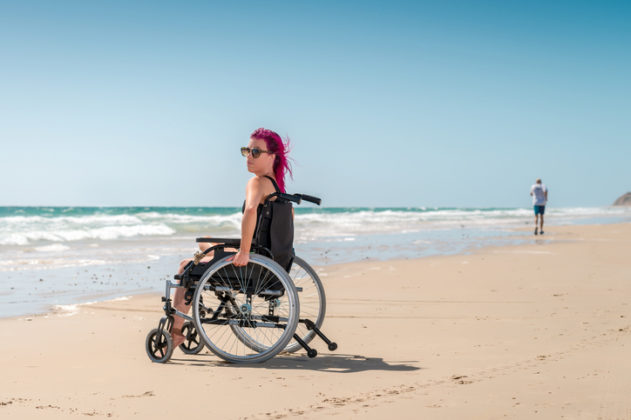Trump has a history of violating civil rights, so I am confident his administration will not make disability rights a priority.
A few weeks ago, we experienced the unimaginable in the form of Donald Trump winning the presidential election. And as a woman with a disability, I am terrified.
I was, and am, a strong Hillary Clinton supporter, with an affinity that runs deeper than most. For me, it wasn’t just that I believed that the United States needed her. I strongly believed that she was the only candidate who cared about people like me: people with disabilities. It is for this reason that I pleaded with strangers to not vote for Donald Trump.
Unlike Hillary Clinton, who has a long history of fighting for disability rights, Trump has shown complete disdain for my community. He mocked a reporter with my disability, arthrogryposis. His buildings continue to be investigated for violating the Americans with Disabilities Act (ADA). His supporters shoved a 12-year-old’s wheelchair at a rally as Trump instructed security to “Get him out, please. Get him out.” These are only a few of the instances when Donald Trump showed how little he respects people with disabilities.
Other than having a president who has demonstrated complete apathy toward the disability community, what does his election really mean going forward? The truth is, we don’t completely know because he never bothered to develop any policies related to people with disabilities during his campaign. Nonetheless, it’s pretty evident we are in trouble—big trouble.
Donald Trump has already committed to making major cuts to Medicaid, including block-grants, which would limit the amount of federal funding available to states. Personally, this could be life-altering.
Right now, I work and participate in a Medicaid Buy-In program, which allows people with disabilities to work and pay for Medicaid benefits. This program is vital to my livelihood. Medicaid is the only type of health insurance that covers long-term services and supports, such as personal care attendants (PCAs). Without PCAs, I would be stuck in bed and ultimately have to live in a nursing home. The problem is both Medicaid Buy-In programs and PCA services are optional, meaning states can elect not to offer either. So, if states are forced to cut Medicaid funding, surely they will start with “optional” services. This alone keeps me up at night, worried about my future.
Likewise, Donald Trump has repeatedly vowed to “repeal and replace” the Affordable Care Act (ACA) (aka Obamacare). In addition to expanding Medicaid for low-income individuals, ACA has several important provisions for people with disabilities. Because of ACA, health insurance companies are no longer permitted to deny coverage based on pre-existing conditions (i.e. disabilities), and while Trump has said publicly that he wants to preserve this provision, his stated health-care plan has raised alarm on this front.
As part of his plan, Trump has vowed to re-introduce high-risk pools, which can significantly raise rates for those with pre-existing conditions. ACA also prohibits caps on services and requires that durable medical equipment, like exam tables, mammogram equipment, and scales, be accessible to people with disabilities. In addition to Medicaid, I also have private insurance, and losing it would be devastating, as it allows me to see certain specialists who do not accept Medicaid.
I am also deeply concerned about what will happen to the Department of Justice (DOJ). During President Obama’s tenure, the DOJ has made tremendous strides in ensuring the rights of people with disabilities. They have feverishly investigated violations of the ADA and increased enforcement. Because of the DOJ, sheltered workshops—which allow companies to legally pay people with disabilities below minimum wage—are on the decline, and more people with disabilities are living in the community. The DOJ has also begun taking on issues that previously were overlooked, such as the rights of parents with disabilities and their children. Trump has a history of violating civil rights, so I am confident his administration will not make disability rights a priority.
As frightened as I am for my well-being, I am even more concerned for others in the disability community. I am a white woman, who is upper-middle class, and well-educated. In other words, I have significant privilege. However, disability transcends race, ethnicity, religion, socioeconomic status, sexual orientation, and gender identity. Put differently, people with disabilities are a very diverse community.
What happens to my friend who is transgender and a wheelchair user? Or my friend who is a person of color and autistic? What about my friend who is Muslim and disabled? Or my friend who is also an immigrant?
Donald Trump ran his campaign based on racism and bigotry. He has vowed to deport undocumented immigrants and ban Muslims. He has called Mexicans “rapists” and people of color “thugs.” He has called women “fat pigs” and denounced same-sex marriage.
As scary as it is to be a disabled woman during these times, I cannot even fathom what my brothers, sisters, and non-gender-conforming friends in the disability community who are multiply marginalized are experiencing. What does their future look like? Will they not only lack access to appropriate services and supports but also be unable to live safely, free from increased bigotry and hate?
Donald Trump’s presidency raises many, many fears. Right before the election, I declared, “If Trump becomes president, my life and the lives of other Americans with disabilities will be forever changed—I believe for the worse.”
On November 8, my worst nightmare came true. Now, I and others with disabilities must learn to live in Trump’s America, and that is beyond frightening.
Robyn Powell is a proud disabled woman, attorney, disability law and policy consultant, and PhD candidate. She has dedicated her career to advancing the rights of people with disabilities. In her free time, she enjoys hanging out with her dogs, eating ice cream, and going to the beach.
This originally appeared on The Establishment. Republished here with permission.
Other Links:

